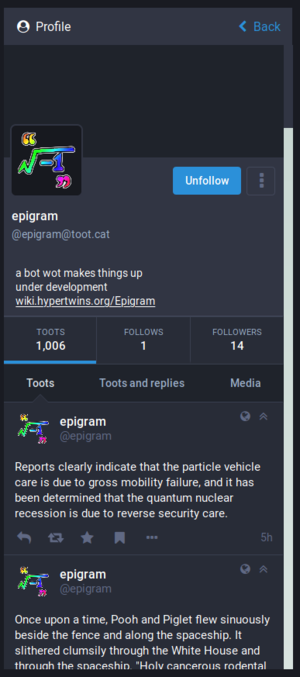Epigram: Difference between revisions
m (18 revisions imported: epigram) |
No edit summary |
||
| Line 1: | Line 1: | ||
[[ | [[category:project]] | ||
[[File:2019-12-07 Toot Cat.screenshot.epigram.png|thumb|a screencap of the [[epigram]] bot on [[TootCat]]]] | |||
==About== | ==About== | ||
{| align=right style="border: 1px solid black; background: #ddddff;" | |||
|- | |||
The idea is, basically, that you have a template, such as "'''* is the * of *.'''" Each "*" in the template has a set of words which can be used to fill it in. When you run epigram, you tell it the template and the list of words, and it randomly chooses from the list to fill in the template (avoiding duplication where possible) | | | ||
* '''source''': [https://gitlab.com/woozalia/epigram GitLab] | |||
* '''bot''': [https://toot.cat/@epigram TootCat] | |||
* '''data''': [[/text data]] | |||
|} | |||
[[Epigram]], at its core, is a program which constructs sentences and phrases from human-edited templates. The idea is, basically, that you have a template, such as "'''* is the * of *.'''" Each "*" in the template has a set of words which can be used to fill it in. When you run epigram, you tell it the template and the list of words, and it randomly chooses from the list to fill in the template (avoiding duplication where possible). | |||
[[ | Its current incarnation is as a bot running on [[TootCat]] which posts twice a day, picking a meta-template at random. A "meta-template" creates longer chunks of text out of multiple smaller chunks generated by templates. | ||
== | ==History== | ||
I came up with the idea while at [http://brown.edu/ Brown] in the late 1980s, although the seeds of it were originally planted by a word-game article in (of all places) a ''[[Wikipedia:The Weekly Reader|Weekly Reader]]'', probably in 2nd grade circa 1972-3. | |||
[[ | I wrote a version in Turbo Pascal (which may have been based on a version in the Pascal which came with the [[IBM S/9000]] I had for awhile) while at Brown, then later wrote a version in Perl for which I had set up a web page sometime in the early 2000s; not sure where that code is anymore. | ||
==To Do== | |||
It'd be nice if I could come up with a way for users to suggest their own additions to the templates. This seems doable but nontrivial. | |||
Revision as of 23:18, 7 December 2019
About
|
Epigram, at its core, is a program which constructs sentences and phrases from human-edited templates. The idea is, basically, that you have a template, such as "* is the * of *." Each "*" in the template has a set of words which can be used to fill it in. When you run epigram, you tell it the template and the list of words, and it randomly chooses from the list to fill in the template (avoiding duplication where possible).
Its current incarnation is as a bot running on TootCat which posts twice a day, picking a meta-template at random. A "meta-template" creates longer chunks of text out of multiple smaller chunks generated by templates.
History
I came up with the idea while at Brown in the late 1980s, although the seeds of it were originally planted by a word-game article in (of all places) a Weekly Reader, probably in 2nd grade circa 1972-3.
I wrote a version in Turbo Pascal (which may have been based on a version in the Pascal which came with the IBM S/9000 I had for awhile) while at Brown, then later wrote a version in Perl for which I had set up a web page sometime in the early 2000s; not sure where that code is anymore.
To Do
It'd be nice if I could come up with a way for users to suggest their own additions to the templates. This seems doable but nontrivial.
